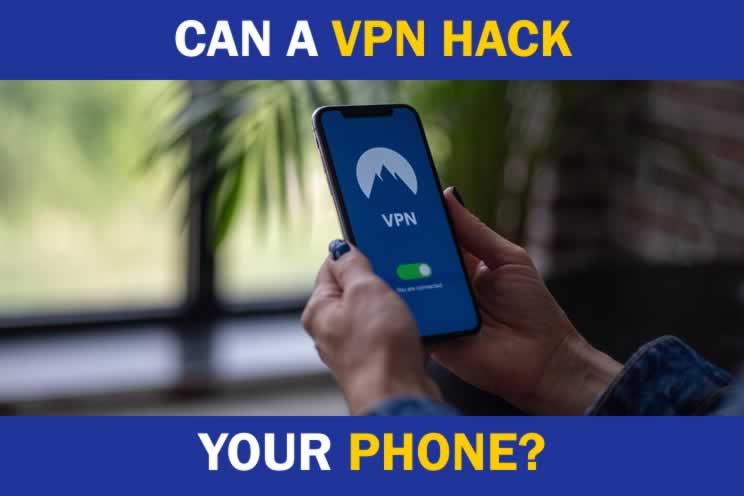
I use a VPN on my smartphone so I can protect myself when I’m using public wi-fi networks in coffee shops. I got wondering about the VPN on my smartphone being safe and decided to do some further investigation.
Can a VPN hack your phone? A reputable VPN will not hack your phone, but bad VPN providers could install malware like spyware, designed to steal personal information. It is important to install VPNs from the phone’s app store where the apps have been verified as safe and not directly from the web browser, as this could allow malicious apps onto your phone.
In the rest of this article I will take a detailed look at how some VPNs could behave maliciously and take advantage of your phone.
Bad VPN apps can ruin your phone
Does a VPN ruin your phone? A bad VPN app can ruin your phone by installing malicious software designed to steal your personal information and spy on your activities. This is why it is very important to use only reputable VPN apps from trusted VPN companies using the app store on your phone.
Not all VPNs are equal, as there are some good reputable VPN providers (check out my latest list) and there is also those VPN providers who are interested in doing malicious things. These malicious VPN providers only have one purpose with their VPN apps and that includes installing spyware on your phone as part of their VPNs installation process, so they can steal your sensitive information.
Are VPN apps safe, check first before installing? You will need to check to see if the VPN app you want to use if safe by checking out for any bad reviews on Google’s search. Also read the reviews on the Apple’s App Store or on Google Play Store. Both App stores will do some for of checking the integrity of the apps in their stores, but occasionally bad apps do still get in.
Is it safe to use a rooted or jail broken phone for VPN?
Using a rooted or jail broken phone for VPN might not end up being a good idea. As both rooting and jail breaking involves giving yourself higher levels of access to the phone. This privileged access allows you to do things that would not normally be possible, as the level of access you have to the phone will have been restricted.
This increase in privilege from rooting and jail breaking also means any applications you install on your phone, will also inherit this level of privilege. Armed with increase privileges these applications can potentially do a lot of damage to the phone by being able to install malware, like spyware, take control of the camera, be able to see all your information like photos, SMS messages and so on.
I would strongly recommend not rooting or jail breaking phones as not only do the phone vendors not support this activity, but you will end up opening your phone to a whole host of threats a non-rooted phone would automatically protect against.
Can you tell if your phone is hacked?
You might not be able to tell if your phone is hacked as it can be hard to tell as some hacks are particularly sophisticated, leaving very few clues behind. However, there may be some tell tale signs your phone is hacked by checking your phone for any changes.
- Strange Apps
- App behavior
- Phone seems slower
- Data spikes
- Pops up
- Ransomware
- Additional photos
Strange Apps
I periodically check my phone to remove apps that I do not use as this can slow down my phone and use additional data in the background. I also make sure there are no apps I do not know about, such as those apps that have been mysteriously installed, as this could indicate my phone has been hacked.
Fortunately, I have never had any of these strange apps appear on my phone and I have malware protection enabled, so if any malicious app did appear, this would be detected in the daily scheduled malware scan.
App behavior
Finding out your apps do not work as they worked before, where they start crashing or failing to start, could indicate the app has been compromised. It is best in such cases to remove the app, run some form of malware scan to see if there is not something lurking in your phone and reinstall the app to see if this improves the situation.
Make sure any apps and their updates you install on your phone are from the official Apple and Google app stores, as anything outside of these app stores can pose significant risks.
Data spikes
Spikes in the data consumed by your phone could indicate something untoward is happening. It makes sense to periodically check your data usage regularly and most phones today have this functionality available.
On my smart phone I can go back a few months to see if my data usage has increased markedly over time. This is especially useful to see if your data has increased but your usage habits have not changed much over the past few months.
Pop ups
I find pop ups annoying messages appearing on website pages and finding you are getting more and more pop up messages over time, could mean there is something wrong. Malicious VPN apps could install additional software during the app installation, that starts to check on what you are doing through your typing and viewing habits. It then tailors any pop ups to your habits, and this can start to become annoying.
Whilst pop ups could be construed as not being malicious, sometimes these pop ups can start to show content like pornography or include malicious scripts, that are totally inappropriate.
Ransomware
Can ransomware infect cell phones? Installing a VPN app from an untrusted source which has hidden ransomware malware, could lead to the malicious VPN app encrypting all your data on your phone and then demanding a ransom (usually payable by bitcoin) to unlock your data.
Additional Photos
Photos or videos you don’t remember taking but appearing in your gallery could also be tell tale signs your phone has been hacked and something malicious is taking pictures. Other signs of camera use could be the flashlight or the video recording light coming on.
I normally check the usage of my apps and see which apps have been most used. If I see the camera app being used a lot, this would give me some indication something isn’t right, especially if I hadn’t taken as many pictures or recorded as many videos I expected.
Should I use VPN on my phone?
A good VPN won’t hack your phone and you should use one on your phone when you are using public Wi-Fi. As any personal information is protected from snooping when accessing websites that may not be using secure connections.
Ideally you should only connect to websites which connect using the HTTPS and not HTTP prefix in the website address. Be careful of public Wi-Fi registration or login pages, make sure they are legitimate as it is quite easy to set up a fake Wi-Fi access point. These registration and login pages may be solely designed to spread malware.
It is not just what you do on your web browser that can be used to determine where you are or even what you are doing, but also what other applications are doing too. On a public Wi-Fi without a VPN, any connections to websites using the HTTPS prefix, will be encrypted and the information being sent will not be visible to anyone else on the public Wi-Fi including hackers.
However, any other connections made from other applications on your smart phone may be giving away personal information if they have not been set up to use secure connections and with many applications out there being written by varying degrees of programming expertise, security may not always be first on the mind of these programmers.
They may instead be focused on getting the apps created as quickly as possible to be able to profit from them without delay.
When in public places, charging stations may also pose a risk, as these could be laden with malware designed to steal your data when you connect using a USB cable directly from your phone.
Conclusion
A VPN app from a reputable VPN provider will not hack your phone by installing malicious software. It is highly recommended some form of anti-malware/virus protection is installed on your phone, to check on the safety of any apps installed.

